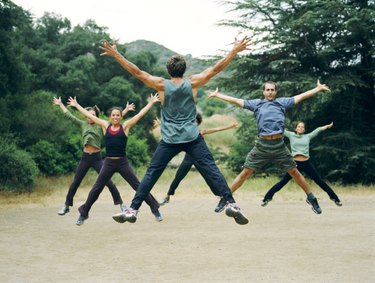
Improve your cardiac health by doing exercises to get your heart pumping. Getting your heart rate up doesn't require training for a marathon or buying fancy equipment — there are simple forms of exercise that will work just as well.
Resting and Target Heart Rates
Video of the Day
Your heart rate refers to the number of times your heart beats per minute, which is also referred to as your pulse, according to the American Heart Association AHA). A typical heart rate when not exercising, known as your resting heart rate, is between 60 and 100 beats per minute. A higher resting heart rate can be concerning because it may indicate a higher risk of heart disease and death, says Sutter Health.
Video of the Day
Read more: How to Determine the Baseline Heart Rate
However, workouts can help. Your heart becomes more efficient when you exercise, says New England Baptist Hospital, because your muscles help to circulate blood through the body, which takes some of the workload away from your heart.
The best exercises to increase heart rate get you to your target heart rate, which varies based on age. Generally speaking, according to the AHA, your maximum heart rate can be determined by subtracting your age from 220. Therefore, if you're 30 years old, your maximum heart rate when exercising is about 190 beats per minute. To get your target heart rate during exercise, aim for 50 to 85 percent of that number, or about 95 to 162 beats per minute for a 30-year-old.
Cardio (Aerobic) Exercises
Cardio activity, also known as aerobic exercise, improves your blood circulation, resulting in a lower resting heart rate, according to Johns Hopkins Medicine. It also decreases your risk of type 2 diabetes, heart disease and high blood pressure, as well as helps control your appetite, helps you sleep better at night, reduces joint stiffness or arthritis pain and boosts your mood, according to the Mayo Clinic.
Cardio refers to any activity that gets your heart pumping, and you should aim for at least 30 minutes a day, five days a week of this type of exercise. The best exercises to increase your heart rate are the ones that you enjoy doing and will continue to engage in regularly. This could mean brisk walking, running, swimming or bicycling, Johns Hopkins says. It could also refer to playing sports, like tennis, or simple at-home activities such as jumping rope or jumping-jack aerobics.
Other Types of Exercise
Traditional cardio workouts, such as running, aren't the only types of exercises to get your heart pumping. If you do them at a fast-enough pace, other workouts such as resistance training and yoga can be some of the best exercises to increase your heart rate.
It's recommended that you do resistance training at least two days a week, Johns Hopkins notes. When it comes to heart health, it might be ideal to do a combination of cardio and resistance training. A study published in January 2019 in PLOS One noted that people who did 30 minutes of aerobic training and 30 minutes of resistance training three times a week had a decreased risk of cardiovascular disease.
Yoga is often thought of being a slow, calming activity, which has its own benefits for the heart. Penn Medicine says that yoga can lower blood pressure and improve cholesterol and blood sugar levels. Specific types of yoga can be considered cardio, though, such as vinyasa yoga, a fast-paced class that gets the heart rate up.
- American Heart Association: "Know Your Target Heart Rates for Exercise, Losing Weight and Health"
- Johns Hopkins Medicine: "3 Kinds of Exercise That Boost Heart Health"
- New England Baptist Hospital: "How Does Exercise Affect Your Heart, and What Are the Benefits?"
- Penn Medicine: "How Yoga Benefits the Heart"
- American Heart Association: "All About Heart Rate (Pulse)"
- Sutter Health: "Get to Know Your Heart Rate: It Might Save Your Life"
- Plos One: "Comparative Effectiveness of Aerobic, Resistance, and Combined Training on Cardiovascular Disease Risk Factors: A Randomized Controlled Trial"
- Mayo Clinic: "Cardio 101: Benefits and Tips"